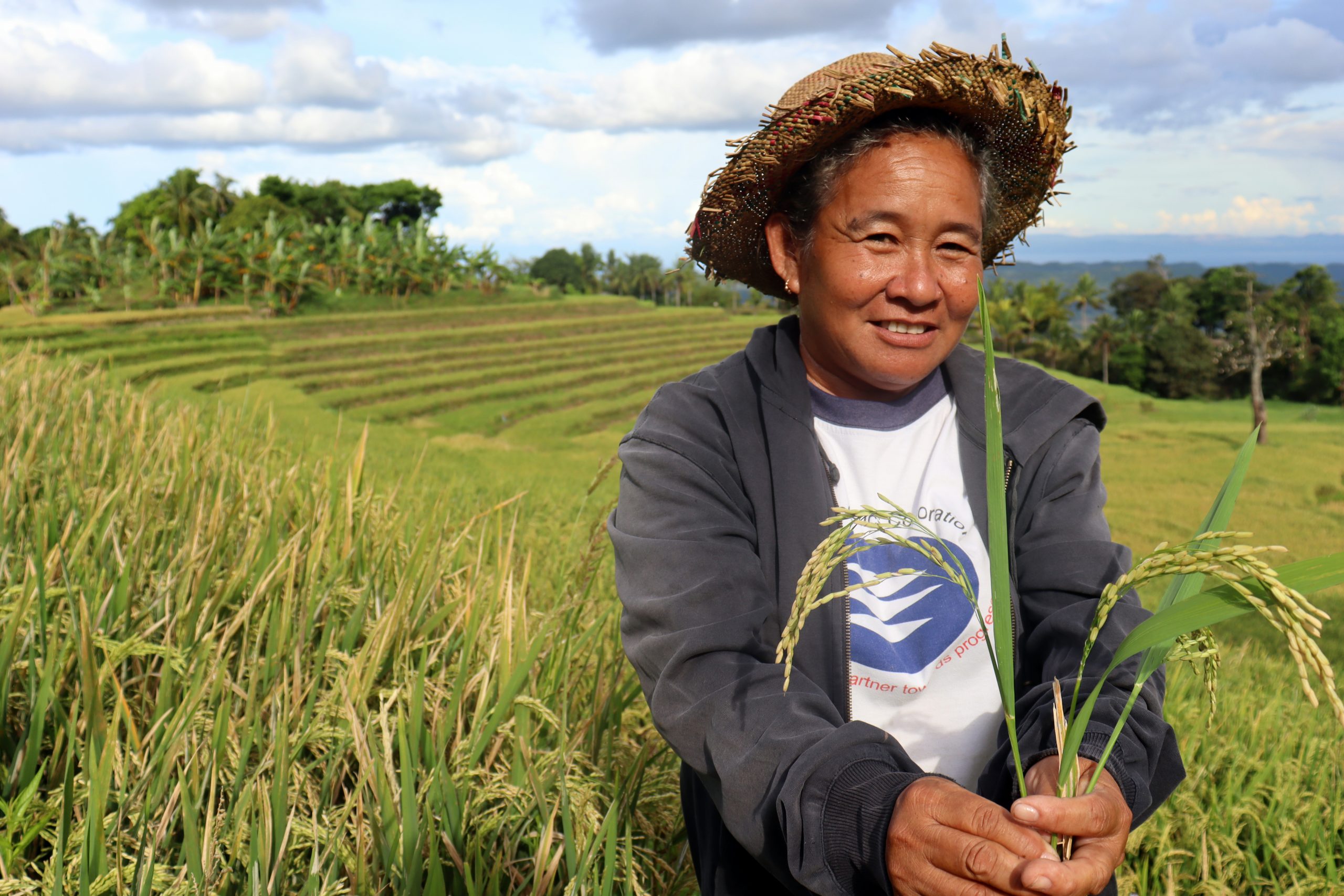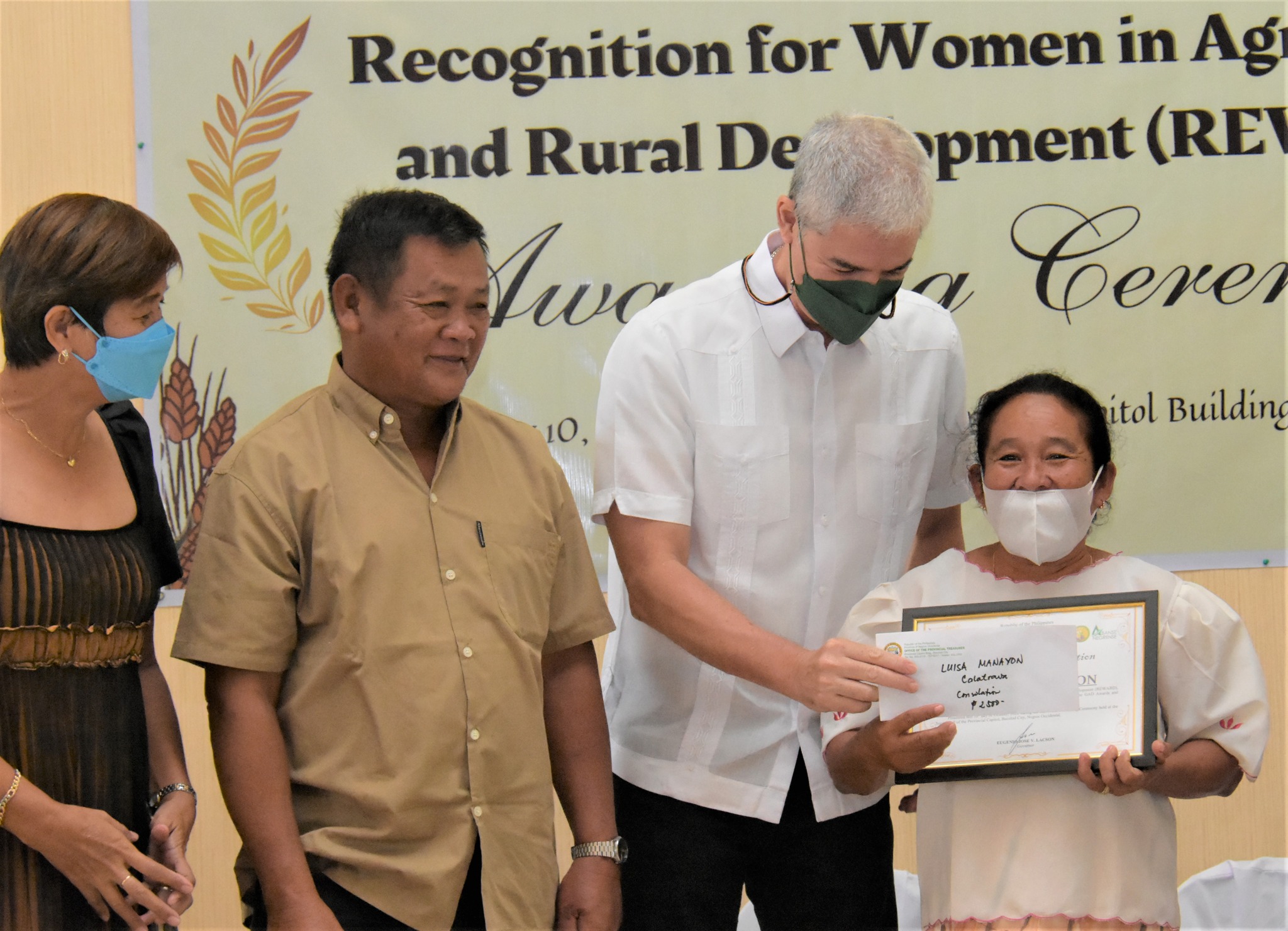Prime Mover of Food Security
When most people are forced to stay home due to the enforced community quarantine brought on by the coronavirus pandemic in mid-March 2020, Mrs. Luisa Manayon was among those who continued to serve her community in a way she knows best – farming.
Luisa, who had been cultivating rice for nearly four (4) decades is among the many small-scale farmers who were badly hit by the pandemic. Due to border closures and travel restrictions, access to livelihood and market was restrained. Overproduction and the lack of means to transport harvested crops to market pushed prices of agricultural commodities downward, adversely restraining economic opportunities and activities of farmers.
Despite these, Luisa kept her rice and backyard vegetable farming to ensure access to food for her family and community in their village in Lalong in Calatrava, Negros Occidental.
“Para indi magutuman ang akon pamilya kag mga pumuluyo sa amon barangay, ako kag upod ang akon mga kabaatan wala guid kami nag untat sang pagpang-uma kay kami nakahibalo nga importante guid nga maka-produce sang pagkaon sa tunga sang pandemya,” said Manayon.
(For my family and community not to go hungry, me and my children did not stop working on our farms because we know it’s important to produce food amid the pandemic.)
About LIUFA
Luisa leads the Lalong Integrated Upland Farmers’ Association (LIUFA) established in 2005. The group with a current member of 50 is a recipient of the SAAD Program’s Rice Production Project in 2020 worth Php 295,450 and supplementary projects worth Php 785,000 in the succeeding years.
According to Luisa, the agricultural inputs from SAAD such as certified rice seeds, fertilizers, pesticides, and farm tools greatly bolstered the production of at least 20 of her members with a consolidated rice area of 50 hectares.
A total of 16.2 metric tons (mt) of rice or 407 sacks (approximately 40kg/sack) were harvested in their first cropping, where farmers sold at least 14 sacks of palay each. It has also been their practice to allocate more or less 10 sacks of rice for home consumption to ensure that their families have enough food on their table.
To provide a source of free healthy and nutritious food to individuals and families in need, Mrs. Manayon also led an initiative in setting up a community pantry in their neighborhood. It can be recalled that the first community pantry was in Quezon City at the height of the pandemic, and led by another woman and private citizen, Patricia Non. The community pantry is a food bank set-up by the people in a specific area, aiming to serve directly the people within and in its perimeters. This then inspired many communities in the country to replicate said private citizen-led response.
Located at the Lalong proper, the villagers contribute food such as fresh vegetables, milled rice, eggs, canned goods and other necessities that are accessed by the locals who are more in need.
Last October, Luisa was hailed as one of the “Outstanding Negrense Women” for Women in Agriculture and Rural Development (REWARD) organized by the Negros Occidental Provincial Government.
Governor Jose Eugenio Lacson lauded Luisa together with the other awardees. “Women always find alternatives and new ways of ensuring food security for their families, and they also pursue multiple livelihood strategies.”
He said that the awarding was proof that even though the narratives of women in agriculture and fisheries get less attention, the value of their work proves otherwise.
Mrs. Manayon, for her part, vowed to continue her efforts in pushing causes such as food security to ensure their community and their whole town free from hunger while thriving through agriculture.
SAAD Program in Negros Occidental
The SAAD Program has already expanded its area of coverage in Negros Occidental from only one (1) municipality to four (4) since the start of its implementation in 2019.
This year, SAAD was able to provide 35 production and livelihood interventions to 80 group beneficiaries with 2,624 members, 1,390 of whom are women farmers and 30 are appointed as FA chairperson. There are also five (5) all-women FAs in the province with 135 group members engaging in livestock and poultry, vegetable, rice and banana production.
Through livelihood interventions and technical assistance, the SAAD program contributed to poverty-stricken communities that seldom receive much-needed support from the government. More so to women farmers in Negros Occidental, once marginalized in terms of economic opportunity, but were empowered and given a voice through SAAD’s agricultural projects. ###
Writer: Christ John Gamarcha, DA-SAAD Region 6 Information Officer



Comments (0)